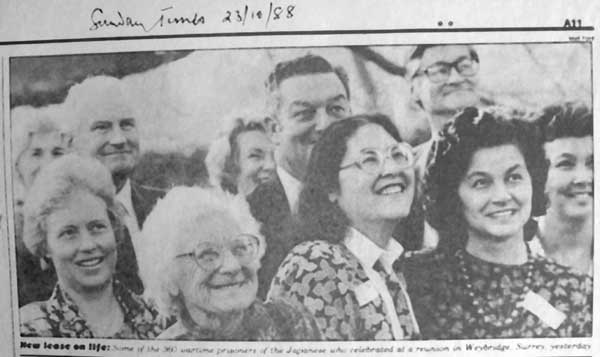
Some
of the 360 wartime prisoners of the Japanese who celebrated at a reunion
in Weybridge, Surrey, yesterday.
(click on the picture for the text)
(click on the picture for the text)
Guests
of His Imperial Majesty
Fiona Eberts reports on a reunion of ex-internees who were trapped by the Japanese invasion
of
Sunday
Times, 23/10/1988
LAST
weekend, at a hotel in Weybridge, 360 people gathered - some from as far as
The ties which brought them together go back to pre-war China, where they formed part of a far-flung European community of doctors, missionaries, teachers, administrators and traders, whose centre was Shanghai, the "Paris of the East" and, by 1939, the world's fifth largest city.
This
colourful era came to an end in the early hours of Monday December 8, 1941,
when the Japanese army marched unopposed into
One of them, Mary Louise Newman, then a 25-year-old second-generation "Shanghailander" recalls: "We awoke to find the Japanese in control of everything. They'd sunk the British gunboat Petrel in the Wangpoo river, taken over the wireless, telegraph, offices and banks.
"All
our accounts were frozen and travel halted. I had planned to book a berth for
Instead, everyone holding an allied passport was ordered to register with the Japanese.
"They gave us red armbands, which we wore at all times. It was very orderly and no-one panicked. We knew we would be interned eventually but it was between 15 to 18 months before we actually went into camps.
"The
Japanese established about 15 Civilian Assembly Centres, some up north in
Chefoo, Weihsien,
Within
the overcrowded camps, people from all strata of
The
day-to-day running of the camps was left to the prisoners themselves, many of
whom had been administrators in
It became a source of fierce pride to present a disciplined, well-organised front, as much to keep "face" with the Japanese as for their own morale.
Hospitals, libraries, theatre groups, and schools were started and with so many educators interned, a high standard of education was maintained.
By August 15, 1945 most people had spent an average of 2 years as "guests of His Imperial Majesty" sharing an experience which created deep bonds.
Early
last year, while in hospital nursing a shattered hip, René Cumberbatch (née
Yates), an ex-internee from
"I'd
heard that
Eighteen months and two heart attacks later, she and her committee found themselves hosting a reunion which united ex-internees from eight camps for a weekend of nostalgia and emotion.
Past displays of memorabilia, photos, camp cartoons; people searched the lobby of the Weybridge hotel, trying to match faces with memories.
For Australian Eddie Weidman it was a charged moment. "I had three favourite ladies in camp and here are two of them," he said, with a broad grin, and an arm around both.
By lunchtime reserve had been replaced by laughter and memories, remembering how they had stirred the breakfast rice gruel at 4 am, bank managers on latrine duty, the Russian lady's wail "For why I am in this constipation camp!", the Japanese signs separating "married women, attached woman and loose women", the way demoralised men at the all-male Footung camp spruced up at the arrival of the women inmates, and on and on into the afternoon.
Internment
was not the only common tie. "Far from the truth," said
Stella Sollars (Barrs), from
"The Japanese were generally pretty reasonable as well. Ballard and Spielberg traded any obligation to the truth for box office and bucks."
One
unexpected result of her attempt to set the record straight was a heartfelt
letter from the Lunghwa Commandant, Mr Tomohiko Hayashi, now 84, promising to visit the
For American, Hank Behrens, captured with the USS President Harrison, the main surprise going into Lunghwa was the kindness shown him by complete strangers.
"My mother is Irish and I never heard one good thing about the British. Turns out I never met a more decent bunch of people in my life."
The consensus appeared to be with Mary Louise (Newman) Leckie: "I feel camp made me a less selfish, more tolerant person of me, and apart from learning never to judge a book by its cover, since it was often the people you least expected who showed up best, I saw that when they have to, people can do just about anything."
